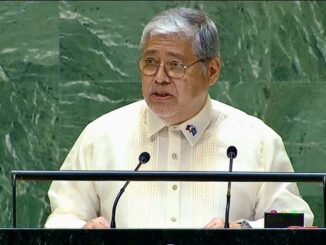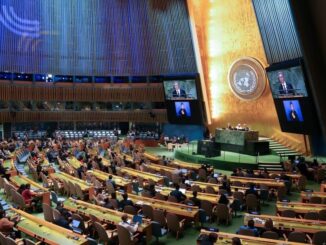
MANILA, Philippines — The Philippines voted in favor of a worldwide moratorium on the use of the death penalty as a lawful punishment at the United Nations General Assembly, joining 129 other nations in a December 17 resolution that reflected the growing international rejection of capital punishment.
The resolution drew a two-thirds majority, with 32 countries opposing and 22 abstaining. Argentina and Italy spearheaded the measure through the Inter-Regional Task Force with 70 co-sponsors.
The resolution gained five more favorable votes than in 2022. Nations that changed their stance were Antigua and Barbuda, which changed their negative votes to votes in favor, while Gabon, Kenya, Morocco and Zambia moved from abstentions to yes votes.
Meanwhile, Bangladesh has changed its position from against to abstention alongside Bahamas and the Republic of Congo.
The UN General Assembly resolution marks the tenth such resolution since 2007, when the UN first framed capital punishment as a human rights issue rather than solely a criminal justice matter. Support has climbed steadily from 104 votes in 2007 to the current 130.
Not all had shifted toward rejecting capital punishment. According to the UN, Guinea and Uganda switched from support to abstention, while Mauritania and Papua New Guinea moved from abstaining to opposing the measure.
The resolution — filed every two years — aims to encourage countries to pause executions while working toward complete abolition of the death penalty.
The Philippines is the first country in Asia — the region that sees the highest executions globally — to abolish the death penalty under the 1987 Constitution. However, capital punishment was briefly reinstated from 1993 to 2006 under President Fidel Ramos amid a rise in ransom kidnappings. Former President Gloria Macapagal-Arroyo permanently abolished capital punishment in 2006 and reduced maximum penalties to life imprisonment.
Yet attempts to restore capital punishment persist. Under the Duterte administration, the House of Representatives passed bills in 2017 and 2021 to reimpose death sentences for drug-related and heinous crimes. Both did not make it past the Senate.
Some lawmakers in the current 19th Congress have expressed their intent to refile a bill to legalize capital punishment. Rep. Robert Ace Barbers, who chairs the House Quadcomm, a mega-panel investigating criminal networks, has floated reviving the death penalty as a deterrent to heinous crimes, including drug-related offenses. No actual bill has been filed.
The UN Office on Drugs and Crime has been pushing to end death sentences for drug offenses, stating that long-term imprisonment serves as an equally effective deterrent. International law restricts death sentences to only “the most serious crimes” — a threshold that drug offenses do not meet.
Asia leads the world in executions, with China, Iran, Singapore, and Saudi Arabia among the most active in carrying out death sentences. The region counts over 20 countries that maintain capital punishment, including Southeast Asian nations Malaysia, Indonesia, Vietnam, and Myanmar.
Japan and India retain the death penalty but use it sparingly, while others like Laos have it in law but haven’t carried out executions in recent years.





Be the first to comment